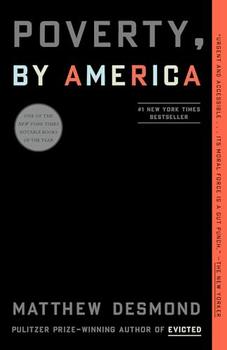Summary | Excerpt | Reading Guide | Reviews | Beyond the Book | Read-Alikes | Genres & Themes | Author Bio

This article relates to Poverty, by America
 When adolescents are baptized at the church where I worship, the recognized ritual is for the pastor to bellow out for all the congregation to hear and for the teenager to repeat: College. Job. Marriage. Family. In that order.
When adolescents are baptized at the church where I worship, the recognized ritual is for the pastor to bellow out for all the congregation to hear and for the teenager to repeat: College. Job. Marriage. Family. In that order.
The words conflate virtue with escaping poverty and are known as the success sequence. In principle, the success sequence is anchored in math. A full-time job will ensure a family can be sustained before children are born. That keeps the government at a distance. However, Princeton sociologist Matthew Desmond points to the flaws in the formula. For one, it blames the poor for their own poverty and what they cannot control: changes in economic trends.
In his book Poverty, by America, Desmond illustrates that income volatility, referring to the fluctuation of paychecks over short periods, has doubled since 1970, meaning that even a full-time job is not necessarily an antidote to poverty.
Poverty is beset with issues more complex than if you work full-time. Cato Institute senior fellow Michael Tanner argues, "The success sequence also ignores the circumstances in which the poor make choices. Our choices result from a complex process that is influenced at each step by a variety of outside factors. We are not perfectly rational actors, carefully weighing the likely outcomes for each choice. In particular, progressives are correct to point to the impact of racism, gender-based discrimination, and economic dislocation on the decisions that the poor make in their lives. Focusing on the choices and not the underlying conditions is akin to a doctor treating only the visible symptoms without dealing with the underlying disease."
The success sequence doesn't account for structural barriers the disadvantaged face, such as the black-white pay gap. "[W]e find equal pay for equal work is not a reality," says Jackson Gruver, a data analyst at the compensation data and software firm PayScale. Commenting on an analysis of differences in earnings between men of color and white men, Gruver notes, "[Black men] are the only racial/ethnic group that does not achieve pay parity with white men at some level."
While many do overcome poverty by following the formula, it is not always easy to plan for what can go wrong. In his book, Desmond tells a tragic story about a personal friend and former roommate, a man named Woo. Woo unknowingly stepped on a nail, and infection set in. Because he was also diabetic, he lost his leg. He now has to depend on $800 of SSI (Social Security Income) monthly and rental assistance.
Conservative thinker George Will has called the success sequence insurance over poverty, but that only applies if all other things are equal and in the absence of bad luck. Like a failing marriage. The success sequence implies you should remain in a bad marriage for the economic benefits of raising a family, despite how damaging it is to the psychology of children to be exposed to parents with a severe dislike of one another or who feel hopeless. Also, poverty affects children directly. C.J. Stroud, an NFL (National Football League) quarterback, experienced financial trauma firsthand when his father Coleridge Bernard Stroud III went to prison. C.J. was thirteen. His father had been the primary wage earner and his absence sunk the family into deep debt.
Desmond writes, "the step in the sequence responsible for nearly all the 'success' is not marriage but securing a full-time job." But because of the current economic realities in which a high school diploma doesn't translate into employment that pays more than the minimum wage, even a person with full-time work is often just one mistake, one job loss, one health crisis, one divorce away from a poverty nightmare.
Graduate in gown walking up steps with cap in hand
Photo by Jefferson Sees, via Unsplash
Filed under Society and Politics
![]() This article relates to Poverty, by America.
It first ran in the December 6, 2023
issue of BookBrowse Recommends.
This article relates to Poverty, by America.
It first ran in the December 6, 2023
issue of BookBrowse Recommends.
Your guide toexceptional books
BookBrowse seeks out and recommends the best in contemporary fiction and nonfiction—books that not only engage and entertain but also deepen our understanding of ourselves and the world around us.